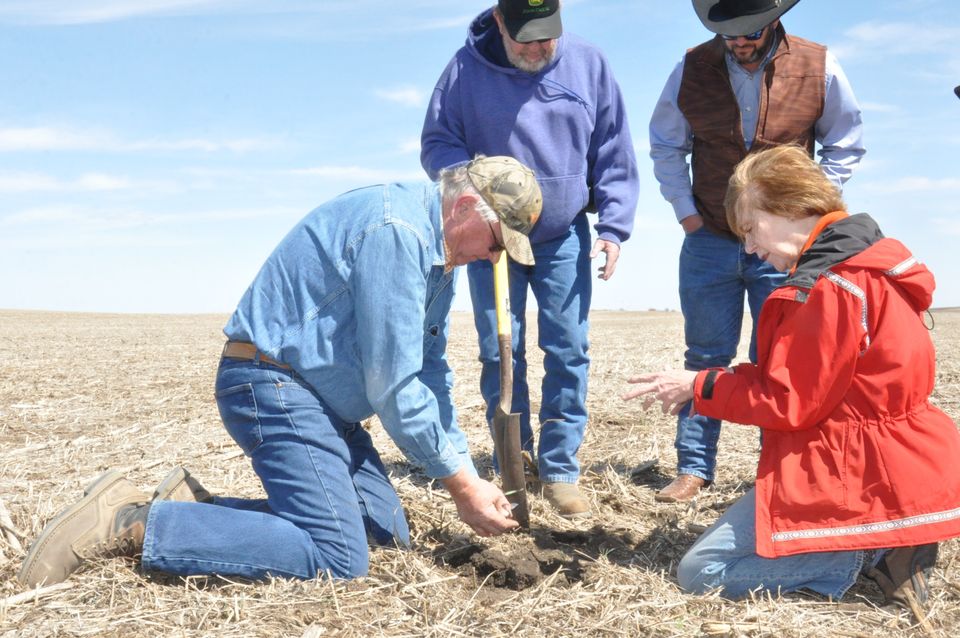Jackson County farmers give Sen. Smith a crash course in soil, water conservation

By Justin R. Lessman
Jackson County farmers Jerry Ackermann, David Pomerenke and Zach Post are always ready to talk about the benefits of cover crops and no-till farming.
Recently, they were able to do so with U.S. Sen. Tina Smith.
Smith visited Jackson County this past spring to learn more about local soil and water conservation efforts under way at present and how federal funding freezes might affect them. On her visit, Minnesota’s junior senator heard about how important certain federal conservation programs are to both local farmers and the environment and how any funding freezes or cuts to them could devastate farm operations and landscapes.
Ackermann, who farms near Lakefield, said programs like the Conservation Stewardship Program and the Environmental Quality Incentives Program have been instrumental in incentivizing farmers to integrate into their operations practices that not only help the environment, but also benefit the farmer.
“There are some good programs,” Ackermann said, though they never seemed to be adequately funded — or to adequately fund — even before talks of funding freezes and cuts began.
Ackermann, Pomerenke and Post gave Smith a crash course in the benefit of environmental practices programs like CSP and EQIP promote, including cover crops and no-till farming.
“It does make a real difference,” Ackermann said of the approach, listing moisture control, yield gain and reduced herbicide costs as benefits.
Additionally, Mark Gutierrez, executive director of the Minnesota Soil Health Coalition, said cover crops improve water quality, sequester carbon, prevent soil erosion and reduce nutrient leaching.
That’s a public benefit, Pomerenke said, warranting a public investment in such incentive programs.
“It’s an incentive — a carrot — that a lot of guys need in order to give it a try,” Pomerenke said. “It’s a way to allay concerns and make people more willing to try it.”
Smith pledged her support for the local ag economy and resistance to any policy that poses a threat to it.
Ackermann also pitched Smith on an idea to promote conservation practices through federal crop insurance. He suggested a discount on crop insurance premiums for farmers who integrate conservation practices like cover crops and no-till farming into their operations.
“Guys who are doing it get a crop insurance discount, and guys who don’t want to do it pay more,” he said. “It’s saying to farmers, ‘If you want to do it the right way, we’ll help you out; but if you’re not going to do it the right way, we won’t help you as much.’”
Smith said she would keep the suggestion in mind as talks on the federal farm bill progress.
Jackson County farmers Jerry Ackermann, David Pomerenke and Zach Post are always ready to talk about the benefits of cover crops and no-till farming.
Recently, they were able to do so with U.S. Sen. Tina Smith.
Smith visited Jackson County this past spring to learn more about local soil and water conservation efforts under way at present and how federal funding freezes might affect them. On her visit, Minnesota’s junior senator heard about how important certain federal conservation programs are to both local farmers and the environment and how any funding freezes or cuts to them could devastate farm operations and landscapes.
Ackermann, who farms near Lakefield, said programs like the Conservation Stewardship Program and the Environmental Quality Incentives Program have been instrumental in incentivizing farmers to integrate into their operations practices that not only help the environment, but also benefit the farmer.
“There are some good programs,” Ackermann said, though they never seemed to be adequately funded — or to adequately fund — even before talks of funding freezes and cuts began.
Ackermann, Pomerenke and Post gave Smith a crash course in the benefit of environmental practices programs like CSP and EQIP promote, including cover crops and no-till farming.
“It does make a real difference,” Ackermann said of the approach, listing moisture control, yield gain and reduced herbicide costs as benefits.
Additionally, Mark Gutierrez, executive director of the Minnesota Soil Health Coalition, said cover crops improve water quality, sequester carbon, prevent soil erosion and reduce nutrient leaching.
That’s a public benefit, Pomerenke said, warranting a public investment in such incentive programs.
“It’s an incentive — a carrot — that a lot of guys need in order to give it a try,” Pomerenke said. “It’s a way to allay concerns and make people more willing to try it.”
Smith pledged her support for the local ag economy and resistance to any policy that poses a threat to it.
Ackermann also pitched Smith on an idea to promote conservation practices through federal crop insurance. He suggested a discount on crop insurance premiums for farmers who integrate conservation practices like cover crops and no-till farming into their operations.
“Guys who are doing it get a crop insurance discount, and guys who don’t want to do it pay more,” he said. “It’s saying to farmers, ‘If you want to do it the right way, we’ll help you out; but if you’re not going to do it the right way, we won’t help you as much.’”
Smith said she would keep the suggestion in mind as talks on the federal farm bill progress.


